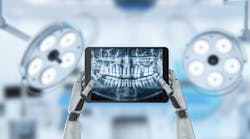How dental AI can help with insurance reimbursement
Artificial intelligence has been all the rage in health care the last few years. Investors contributed $31.5 billion in equity funding in health-care AI between 2019 and 2022, according to CB Insights.1 In 2023, there were more than 1,500 health-care AI vendors, more than half of which were founded during the last seven years.1
Many of the vendors offer AI programs that assist with various aspects of clinical care and administrative tasks in dentistry. AI systems provide the ability to automate time-consuming tasks, create clinical consistency, elevate patient care, and reduce costs. Additionally, AI-supported software can help increase insurance claim acceptance.
Submitting claims with evidence-based data
AI technology adds third-party objectivity to the dentist’s diagnoses. Adding AI analysis of radiographic or photographic images to insurance claims assists with acceptance since the subjectivity has been removed from the equation. The presence of radiographic bone loss or caries lesions are no longer an opinion; they’re a proven fact. For example, dental insurance companies typically require evidence of radiographic bone loss in addition to periodontal probing depths to support scaling and root planing claims. Dental AI software can provide bone level quantification. The practice can submit a picture with AI-generated measurements as part of the claim. This is important because periodontitis assessment can be very subjective. In one study, 16% of participating clinicians disagreed with their own original diagnosis.2 Using AI to support clinical decisions with consistent, statistically based radiograph analysis can help eliminate ambiguity and improve outcomes.
Preventing coding errors
AI can help prevent coding errors such as over-coding or under-coding. For example, a patient may present with heavy calculus buildup, generalized inflammation, unhealthy pocket depths, and bleeding on probing. A dental provider may recommend and schedule scaling and root planing to address the severe inflammation. It may not be easy to determine whether calculus is located on enamel or root surfaces. However, AI analysis may show there is no significant bone loss and all the calculus deposits are on the enamel surfaces of the teeth. In this case, a scaling with inflammation code may be appropriate to ensure insurance claim acceptance.
Under-coding is another possible scenario. For example, a young patient with healthy bone levels has periodontal assessment that reveals mostly normal probing depths and appears to have minimal plaque and calculus buildup. A provider might decide to code the hygiene visit as a prophylaxis. However, there might be more than 30% bleeding on probing recorded, as well as erythematous and edematous tissue evident on intraoral photographs. With AI-assisted diagnosis, after analyzing all the data, therapeutic gingivitis treatment or scaling with inflammation might be more appropriate for this patient.
Assisting with claim documentation
AI ensures perfect claims the first time so there are no rejections or requests for more information. AI learns all different insurance plans, codes, and conditions for a procedure to be reimbursed. AI may suggest ways to enhance documentation so that claims are accepted upon initial submission. For example, it reminds the provider to include a narrative with certain procedures and even provides a sample narrative.
AI learns from rejections and evolves. The data AI learns from comes from multiple practices, not just one. AI systems continuously learn from new data and past experiences, improving their accuracy and efficiency over time and adapting to changes in insurance policies and regulations.
Reducing claim denials
AI algorithms can extract relevant information, such as patient details, policy numbers, and coverage specifics from various sources, eliminating manual data entry errors. In addition, bots powered by AI can log into insurance provider databases to verify patient eligibility in real time. They can also interpret and analyze insurance policies to understand the extent of coverage, including deductibles, copays, and exclusions. This ensures that all necessary information is accurately captured and verified, which reduces the risk of claim denials.
Finally, AI-driven systems can prevalidate claims against verified insurance information. This ensures that only eligible claims are submitted, it reduces the chances of rejection, and it speeds up the reimbursement process.
Preventing insurance fraud
Insurance companies are concerned about fraud, but fraud is rare. Simple user errors are much more frequent, primarily in recording details. Improving accuracy with AI can prevent errors that are mistaken for fraud. AI does not suffer from eye fatigue, boredom, stress, or lack of focus; it can process claim after claim with complete accuracy, unlike human insurance coordinators.
AI systems are the way of the future and dentistry is no exception. Even though when I hear “artificial intelligence” I have visions of sci-fi movies involving hostile machines and world takeover, it’s a good idea to accept the inevitable (it’s called progress) and familiarize ourselves with the different dental AI programs. We might actually find them useful in more ways than one.
References
- Sekerak C. The state of healthcare AI in 5 charts. CB Insights Research. August 2, 2023. www.cbinsights.com/research/healthcare-artificial-intelligence-ai-market
- Teich DA. Artificial intelligence and dental insurance—it is more than a focus on radiology and fraud. Forbes. February 3, 2022. https://www.forbes.com/sites/davidteich/2022/02/03/artificial-intelligence-and-dental-insurance--it-is-more-than-a-focus-on-radiology-and-fraud/
About the Author

Anastassia Stoenelova, BA, RDH
Anastassia Stoenelova, BA, RDH, has been in dentistry for 10 years. She is a clinical practitioner in general dental practices in Atlanta, Georgia. As a former ESL instructor, she is passionate about oral health education and making a difference in her patients’ lives every day. She also works with Second Wind Dreams, a nonprofit organization that educates health-care professionals about dementia. She can be reached at [email protected].


